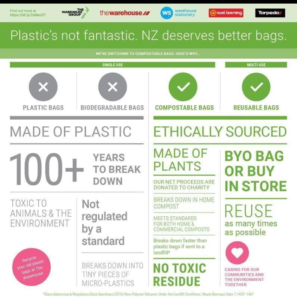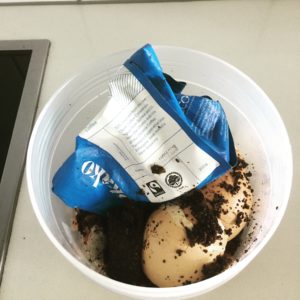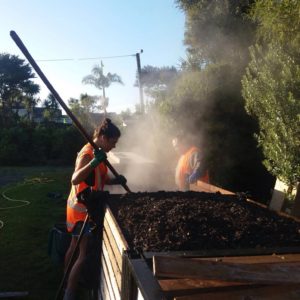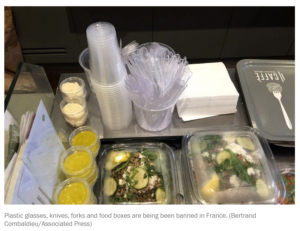I am frustrated with the recent media coverage around the topic of compostable packaging because the compostable plastics aren’t being differentiated from the other compostable packaging materials.
A matter of semantics you may say, but it’s really important. It is the compostable plastics that are causing an issue for the composters, not the compostable wheat straw, sugar cane, potato starch, bamboo, or paper packaging materials.
I have been involved with the composting of plastics and worked at one of New Zealand’s leading compostable packaging businesses (Innocent Packaging) for two and a half years. As much as I refuse and reuse packaging wherever possible (I’m on my 6th year of doing Plastic Free July), I am a big believer that compostable packaging and compostable plastics will play a huge role in the circular economy, creating our sustainable future, and solving the plastic pollution crisis.
So it’s really important that we get the messaging right.
The issue with the compostable plastics generally comes down to 3 reasons: 1 – they require a well-managed compost that is hot enough to ensure they biodegrade within their certified amount of time (typically 12 weeks), 2 – they contaminate the recycling collections due to the difficulty in differentiating them from recyclable plastics, and 3 – the majority of compostable plastics are made from GMO corn.
The GMO conversation is for another day, but why it matters here is that the organisations who certify finished compost as organic regard compostable plastics as “synthetics”. If a compost contains too much synthetic feedstock they won’t award it the organic certification.
There are certifications available internationally that compostable plastics can achieve which state that they biodegrade back into nitrogen, carbon, and water leaving no toxic residues behind. Having researched them in-depth and also having composted plastics I am trusting of these certifications.
On a side note, there are currently no exclusions for GMO food going into a certified organic compost.
The issue around the heat of a compost can be overcome with the right infrastructure and the right methodology. Envirofert is a commercial composter based in Tuakau who has been accepting compostable plastics for years and are openly asking for more. Their composting infrastructure includes air pipes that were built underneath the windrows (long piles of compost) which ensures the compost stays aerated and the microorganisms thrive.
This air (oxygen), along with the right balance between nitrogen, carbon, and water ensures temperatures above 60℃ are consistently achieved (no external heat or energy is applied). 60℃ is the temperature (amount of energy) commercially compostable plastics require to break apart the molecular bonds within the materials and begin to biodegrade.
The home compostable plastics require less heat (energy) to break apart their molecular bonds.

As well as seeing a commercial compost site in action I have been fortunate enough to work with one of New Zealand’s greatest composters, Richard Wallis. Richard has developed a system (New Zealand Box Ltd) that will help shape the future of composting in NZ. In the not too distant future, we will see a network of community composting sites across our towns and cities that are based around a 1.5 cubic metre compost box he designed. These compost sites will support a network of regenerative urban farms that sequester carbon and provide an abundance of nutritious food (aka real food) to the locals (minimal food miles and the reduced need for packaging are a couple of other benefits worth mentioning).
Richard always achieves temperatures of 60℃ or above in his composts and has no issue processing the compostable plastics (although it is important to note that it does require extra labour to shred it before adding it). You can see Richards compost systems in action at a number of Auckland’s community gardens as well as a well-known sports ground, Eden Park.

It’s another topic for another day but we could be capturing the heat generated by these composts.
As for the GMO issue around compostable plastics, I am of the view that packaging suppliers and manufacturers, composters, central and local governments, and the New Zealand public all need to work together on this. Any new technology takes time to improve and it always has impacts on other industries. It’s not a silver bullet but it’s part of the solution.
The GMO feedstock used to make these compostable plastics is commonly corn grown in the USA. This corn is very cheap due to the government subsidies paid to the corn industry there, the well-established supply chains, and the industrial style farming methods.
These industrial farming methods are having a hugely devastating impact on the local environment there, and on the rise and rise of diet-related illnesses (as they are all over the world). They sure as hell aren’t sustainable and will have to be changed.
But the price of this compostable plastic matters, because it is competing against a cheaper alternative produced by one of the most powerful industries the world has ever seen. The fossil fuel plastics industry. And don’t expect them to let go of their decades of investment and market dominance easily. In fact in the face of the plastic pollution crisis plastic production is forecast to continue to skyrocket.
Let’s not let that happen in New Zealand. Now that we have certified compostable packaging available can we not follow the lead of France and Canada in phasing-out the petrochemical versions?

If we are to truly solve the plastics pollution crisis in NZ we really need everyone to collaborate and work through the various solutions together. If we do solve it, the New Zealand Inc brand will be hugely enhanced and the world will come knocking.
Seeing the decision made by Capital Compost in Wellington recently highlights to me that there has clearly been poor communication and engagement between the compostable packaging folk and the composters. It’s a really good example of how important it is that all stakeholders talk and listen to each other as we make this shift to the circular economy and sustainable future.
Yes, people should absolutely bring a reusable cup for their coffees (or even better drink it in and take a load off), but stopping the use of all takeaway packaging would alienate too many people who aren’t yet as open to changing their ways (aka saving the world). And you only need to look at the rise and rise in the popularity of Uber Eats or take a look in a Kiwi household on a Friday night, to see the amount of takeaway packaging that is being used across the country. Many small New Zealand business would go under without packaging.
So let’s work with the compostable packaging suppliers and manufacturers and let’s work with the composters.
I suggest we give suppliers and manufacturers 2 years to ensure all feedstock they use is non-GMO, another 2 years to ensure it comes from organic sources, and a final 2 years to make sure its sourced from organically grown NZ plantations (or plantations making the transition to organics). A great solution for farmers looking to reduce cow numbers no?
And what if the central government and locals governments (as part of the actions to support their recent climate emergency declarations) provide existing commercial composting operations with the resources to ensure they can consistently achieve the conditions for processing the compostable plastics, and quickly and efficiently shred it before adding it?
Or what if we work with composters to create certified organic compost for food growing and non-organic for forestry and landscaping?
Make packaging from plants, compost after use. That is what nature has been doing for the past few billion years after all.
So in summary:
- Get the messaging right around compostable packaging and compostable plastics;
- Remove petrochemical takeaway packaging from the market;
- Ensure only certified compostable plastics are allowed in the market;
- Increase our commercial and community composting infrastructure and capabilities;
- Transition to ensuring all compostable plastics are made using non-GMO feedstock grown in NZ;
- Educate the public on where to put compostable plastics and how they are processed;
- Compost the compostable plastics (and other compostable packaging);
- Feed our soils with compost.
Yours compostably,
Nick Morrison
Founder / Director
Go Well Consulting

